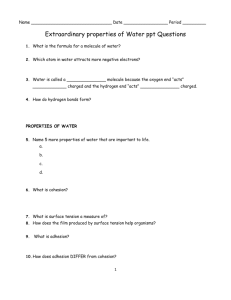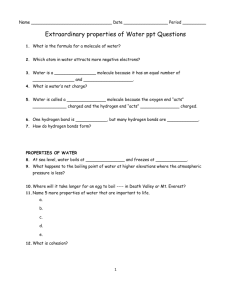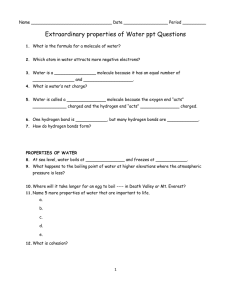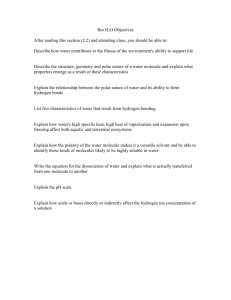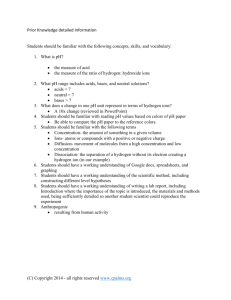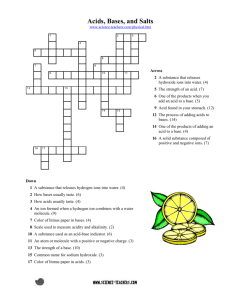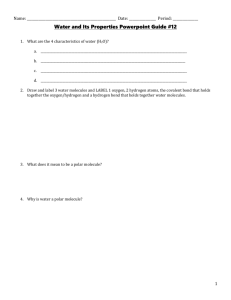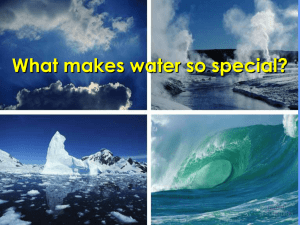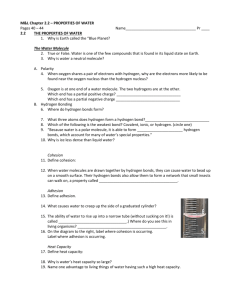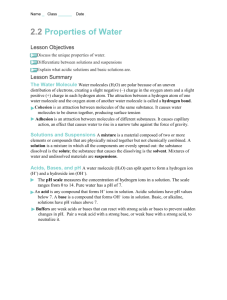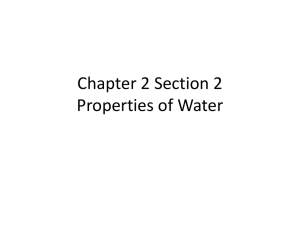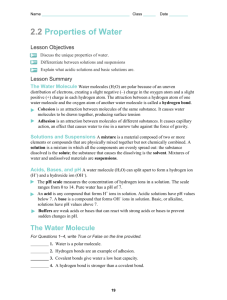The Extraordinary Properties of Water
advertisement
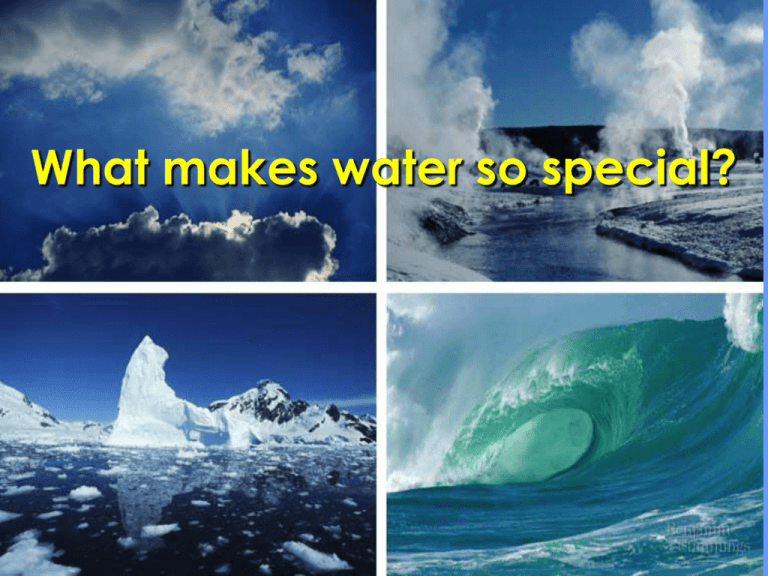
What makes water so special? Water • A water molecule (H2O), is made up of three atoms --- one oxygen and two hydrogen. H H O Inside an Atom Atomic Bonding • Animations on atomic bonding So…what makes water so special? Water has unique properties that impact the role it plays on the Earth in all the spheres (hydrosphere, lithosphere, atmosphere, and biosphere). What are the Properties of Water? Properties of Water •Polarity •Cohesion •Adhesion •High Specific Heat •High Heat of Vaporization •Less Dense as a Solid Water is Polar!!!! • The oxygen end “acts” negative • The hydrogen end “acts” positive • Causes the water to be POLAR, like a magnet. Hydrogen Bonds Exist Between Water Molecules • Formed between a highly Electronegative atom (like oxygen in another water) of a polar molecule and a hydrogen • Weak bond, but strong in great numbers. Interaction Between Water Molecules Negative Oxygen end of one water molecule is attracted to the Positive Hydrogen end of another water molecule to form a HYDROGEN BOND Cohesion • Attraction between particles of the same substance ( why water is attracted to itself) • Results in surface tension (a measure of the strength of water’s surface) Cohesion … Helps insects walk across water, but how is it helpful to people? Adhesion • Attraction between two different substances. • Water will make hydrogen bonds with other surfaces such as glass, soil, plant tissues, and cotton. • Capillary action-water molecules will “tow” each other along when in a thin glass tube. Adhesion Causes Capillary Action Which gives water the ability to “climb” structures High Specific Heat • Amount of heat needed to raise or lower 1g of a substance 1° C. • Water resists temperature change, both for heating and cooling. – Would you rather walk on sand or in water on a beach on a hot summer day? – Which would be warmer that night? Why? High Heat of Vaporization • Water vapor forms a kind of global ‘‘blanket” which helps to keep the Earth warm. • Heat radiated from the sun warmed surface of the earth is absorbed and held by the vapor. Water is Less Dense as a Solid •Which is ice and which is water? Solutions & Suspensions • Water is usually part of a mixture. • There are two types of mixtures: – Solutions: substance dissolves in liquid – Suspensions: substance suspends in liquid Solutions Water is the solvent, salt is the solute salt water is the solution Suspensions • Substances that don’t dissolve but separate into tiny pieces. Acids, Bases and pH One water molecule is made of two ions, (H+) and a Hydroxide Ion (OH-) H2O H+ Hydrogen Ion Acid + OH - Hydroxide Ion Base Acids and Bases Acid: A solution with lots of H+ ions • pH 0 up to 7 is acid (acidic) Base: A solution with lots of OH- ions • pH above 7 – 14 is basic (alkaline) The pH Scale…acids • Indicates the percent of H+ ions • Ranges from 0 – 14 • pH of 7 is neutral • Each pH unit represents a factor of 10X change in concentration – pH 3 is 10 x 10 x 10 (1000x) stronger than a pH of 6 The pH Scale…bases Buffers • Weak acids or bases that react with strong acids or bases to prevent sharp, sudden changes in pH (neutralization). • Produced naturally by the body to maintain homeostasis Weak Acid Weak Base Human biology and pH • Your blood maintains a pH of 7.35 – 7.45 (slightly basic) – Balance is maintained by buffers in blood, breathing, and urinating • The human vaginal canal has a pH of 3.8 – 4.5…Why? Quick Quiz 1. Draw a water molecule with labeled atoms and charges. 2. Describe how water is sticking to itself? 3. What makes a solution acidic? 4. What has a higher pH, bleach or lemon juice? 5. Why do we sweat?
